人教版六年级上册英语笔记
pep六年级上册英语笔记
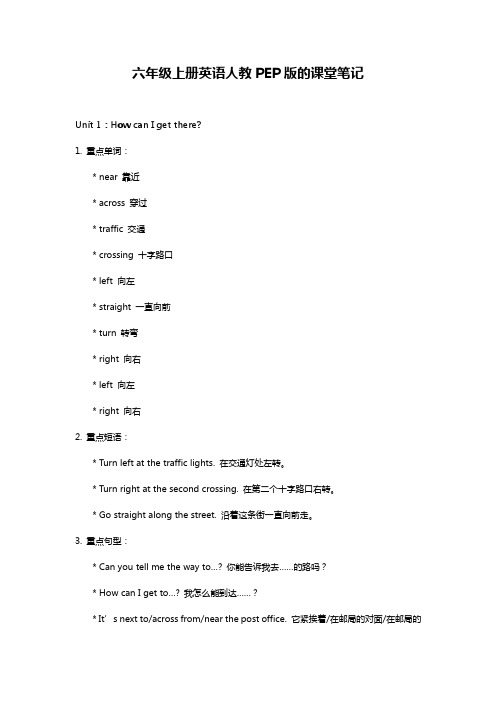
六年级上册英语人教PEP版的课堂笔记Unit 1:How can I get there?1. 重点单词:* near 靠近* across 穿过* traffic 交通* crossing 十字路口* left 向左* straight 一直向前* turn 转弯* right 向右* left 向左* right 向右2. 重点短语:* Turn left at the traffic lights. 在交通灯处左转。
* Turn right at the second crossing. 在第二个十字路口右转。
* Go straight along the street. 沿着这条街一直向前走。
3. 重点句型:* Can you tell me the way to…? 你能告诉我去……的路吗?* How can I get to…? 我怎么能到达……?* It’s next to/across from/near the post office. 它紧挨着/在邮局的对面/在邮局的附近。
4. 语法知识:* 用“Can you tell me the way to…?”和“How can I get to…?”询问道路和交通方式。
* 用“next to/across from/near”等介词表达位置关系。
5. 功能话题:问路和指路,描述位置关系。
6. 文化知识:了解不同国家的交通规则和交通标志。
Unit 2:Where is the science museum?1. 重点单词:* science museum 科学博物馆* library 图书馆* hospital 医院* cinema 电影院* post office 邮局2. 重点短语:* Excuse me. 对不起。
* Thank you very much/a lot. 非常感谢你。
3. 重点句型:- Excuse me, where is the science museum? 对不起,请问科学博物馆在哪里?- It’s next to/across from/near the post office. 它紧挨着/在邮局的对面/在邮局的附近。
六上英语人教版unit1笔记

Unit 1 Hello!一、词汇1. 尊称:name2. 你好:hello3. 问候:greeting4. 再见:goodbye二、句型1. 你好,我是李明。
Hello, I'm Li Ming.2. 再见,老师。
Goodbye, teacher.三、对话A: Hello, I'm Li Ming.B: Hi, Li Ming. I'm Amy. Nice to meet you. A: Nice to meet you, too.B: Goodbye, Li Ming.A: Goodbye, Amy.四、语法1. 句子的基本结构:主语+谓语2. 动词 be 的用法:am, is, are3. 形容词的位置:在名词前面4. 人称代词的用法:I, you, he, she, it, we, they5. 介绍自己的句型:Hello, I'm + 尊称。
6. 说再见的句型:Goodbye, + 对方的名字。
五、笔记复习1. 温故知新通过复习,加深对词汇、句型和对话的印象,巩固基础知识。
2. 刻意练习反复练习对话,提高口语表达能力,增加语感。
3. 合理安排时间控制复习时间,避免长时间枯燥的学习,保持专注力。
4. 看图说话通过图片复习词汇和句型,增强记忆效果。
5. 互相交流与同学互相复习,用英语交流,提高学习效率。
六、总结通过本单元的学习,我学会了英语的基本问候和介绍方式。
我对英语的人称代词、动词 be 的用法以及形容词的位置也有了更深的了解。
在以后的学习中,我会继续加强对这些知识点的掌握,不断提高自己的英语口语表达能力。
感谢老师的教导,让我有了更好的英语学习体验。
以上是我对六上英语人教版Unit 1 的笔记总结,希望对大家有所帮助。
在上面的基础上,我还想补充一些关于英语学习的方法和技巧。
七、学习方法和技巧1. 多听多说在学习英语时,尽量多听一些英语的材料,比如英语歌曲、英语电影、英语广播等,这样能够锻炼自己的听力和口语表达能力。
六年级上册英语人教版笔记

六年级上册英语人教版笔记Unit 1: Meeting new people1. Greet people- Hello! How are you?- Hi! Nice to meet you.- Good morning/afternoon/evening.2. Introduce themselves- My name is...- I am from...- I am in Grade 6.3. Ask for and give personal information- What's your name?- Where are you from?- How old are you?- What grade are you in?4. Talk about their family- I have a big family.- I have a sister and a brother.- I live with my parents.Unit 2: My school1. Talk about school facilities- Our school has a library.- We have a computer room.- The playground is big and beautiful.2. Describe school subjects- I like English.- I am good at Math.- Science is interesting.3. Discuss school activities- We have art classes.- I enjoy P.E. lessons.- We have music lessons.Unit 3: My home1. Describe their rooms- I have a big bedroom.- My room is clean and tidy.- I have a desk and a bookshelf.2. Discuss household chores- I help my parents with the dishes. - I feed the pets.- I water the plants.3. Talk about their neighborhoods- Our neighborhood is quiet.- There is a park nearby.- The people are friendly.Unit 4: My day1. Describe daily routines- I wake up at 7 o'clock.- I brush my teeth and wash my face. - I go to bed at 9 o'clock.2. Talk about free time activities - I play football with my friends. - I read books in my free time.- I watch TV after school.3. Discuss meals and snacks- I have breakfast at 7:30.- I take sandwiches to school for lunch. - I have fruit for a snack.。
人教版六年级上册英语知识点汇总
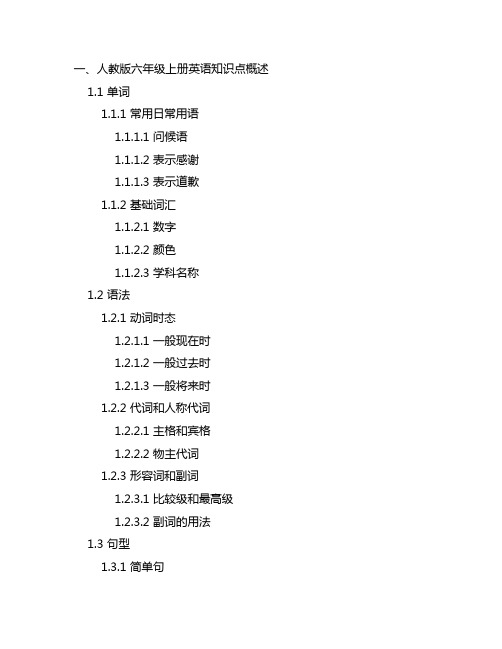
一、人教版六年级上册英语知识点概述1.1 单词1.1.1 常用日常用语1.1.1.1 问候语1.1.1.2 表示感谢1.1.1.3 表示道歉1.1.2 基础词汇1.1.2.1 数字1.1.2.2 颜色1.1.2.3 学科名称1.2 语法1.2.1 动词时态1.2.1.1 一般现在时1.2.1.2 一般过去时1.2.1.3 一般将来时1.2.2 代词和人称代词1.2.2.1 主格和宾格1.2.2.2 物主代词1.2.3 形容词和副词1.2.3.1 比较级和最高级1.2.3.2 副词的用法1.3 句型1.3.1 简单句1.3.1.1 肯定句1.3.1.2 否定句1.3.1.3 疑问句1.3.2 复合句1.3.2.1 并列句1.3.2.2 定语从句1.3.2.3 状语从句二、人教版六年级上册英语知识点详解2.1 单词2.1.1 常用日常用语2.1.1.1 问候语问候语是指在英语日常交际中用于打招呼和示好的常用词汇,包括Hello、Hi、Good morning、Good afternoon等等。
2.1.1.2 表示感谢表示感谢的常用词汇有Thank you、Thanks a lot、Thank you very much等,用于表达对别人的帮助或礼物表示感激之情。
2.1.1.3 表示道歉表示道歉的词汇包括I'm sorry、Excuse me、Pardon等,在日常生活中,用于向别人道歉或请求对方让步的场合。
2.1.2 基础词汇2.1.2.1 数字数字是英语基础词汇的重要部分,包括基本的数字表达方式和计量单位,如one、two、three等,以及hundred、thousand等。
2.1.2.2 颜色颜色是描述事物外观的重要词汇,在日常交流中也经常用到,包括red、blue、yellow等常见颜色词汇。
2.1.2.3 学科名称学科名称涉及到人们日常生活和学习工作的方方面面,包括mathematics、music、art等,是学习英语时必须掌握的词汇。
六年级上册1~6单元英语笔记
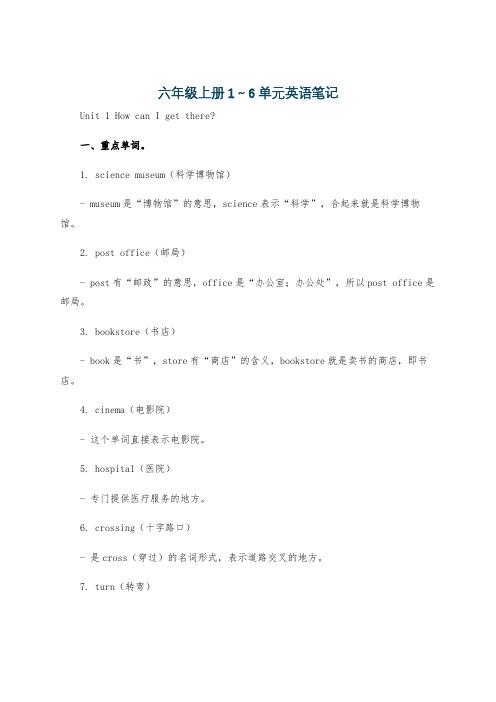
六年级上册1~6单元英语笔记Unit 1 How can I get there?一、重点单词。
1. science museum(科学博物馆)- museum是“博物馆”的意思,science表示“科学”,合起来就是科学博物馆。
2. post office(邮局)- post有“邮政”的意思,office是“办公室;办公处”,所以post office是邮局。
3. bookstore(书店)- book是“书”,store有“商店”的含义,bookstore就是卖书的商店,即书店。
4. cinema(电影院)- 这个单词直接表示电影院。
5. hospital(医院)- 专门提供医疗服务的地方。
6. crossing(十字路口)- 是cross(穿过)的名词形式,表示道路交叉的地方。
7. turn(转弯)- 既可以作动词,如turn left(向左转),turn right(向右转);也可以作名词。
二、重点短语。
1. near(在……附近)- 例如:The post office is near the bookstore.(邮局在书店附近。
)2. next to(紧挨着;与……相邻)- My home is next to the cinema.(我的家紧挨着电影院。
)3. in front of(在……前面)- There is a tree in front of my house.(我家前面有一棵树。
注意:in front of是在物体外部的前面,而in the front of是在物体内部的前面,如There is a blackboard in the front of the classroom.教室里前面有一块黑板。
)4. behind(在……后面)- The cat is behind the box.(猫在盒子后面。
)5. go straight(直走)- Go straight and you can see the hospital.(直走你就能看到医院。
英语六年级上册笔记第一单元

英语六年级上册笔记第一单元一、重点单词。
1. science museum(科学博物馆)- 记忆方法:science(科学)+museum(博物馆)。
- 例句:We are going to the science museum this weekend.(这个周末我们打算去科学博物馆。
)2. post office(邮局)- 注意“post”的发音:[pəʊst]。
- 例句:I sent a letter at the post office yesterday.(我昨天在邮局寄了一封信。
)3. bookstore(书店)- 联想记忆:book(书)+store(商店)。
- 例句:There are many interesting books in the bookstore.(书店里有很多有趣的书。
)4. cinema(电影院)- 发音:['sɪnəmə]。
- 例句:Let's go to the cinema to see a movie.(让我们去电影院看电影吧。
)5. hospital(医院)- 例句:My mother is a doctor in the hospital.(我的妈妈是医院里的一名医生。
)6. crossing(十字路口)- 例句:Turn right at the second crossing.(在第二个十字路口右转。
)7. turn(转弯;转变)- 常见搭配:turn left(向左转),turn right(向右转)。
- 例句:You should turn left at the post office.(你应该在邮局处左转。
)8. straight(笔直地)- 例句:Go straight and you will see the park.(直走你就会看到公园。
)二、重点短语。
1. near the park(在公园附近)- 例句:My home is near the park.(我的家在公园附近。
六年级上册英语第一课笔记人教版
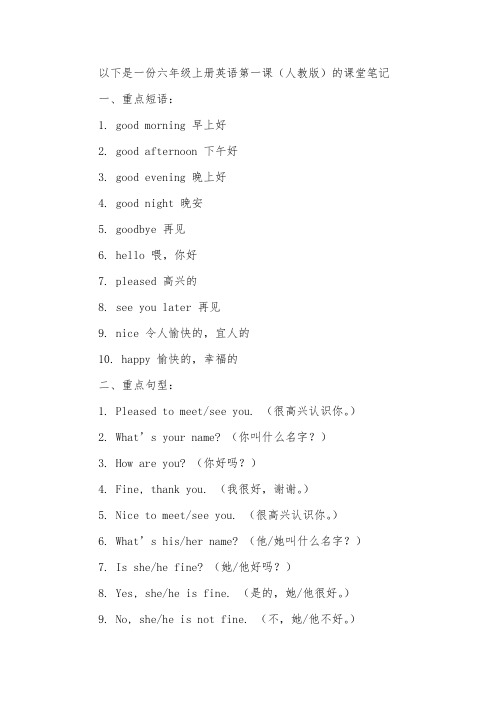
以下是一份六年级上册英语第一课(人教版)的课堂笔记一、重点短语:1. good morning 早上好2. good afternoon 下午好3. good evening 晚上好4. good night 晚安5. goodbye 再见6. hello 喂,你好7. pleased 高兴的8. see you later 再见9. nice 令人愉快的,宜人的10. happy 愉快的,幸福的二、重点句型:1. Pleased to meet/see you. (很高兴认识你。
)2. What’s your name? (你叫什么名字?)3. How are you? (你好吗?)4. Fine, thank you. (我很好,谢谢。
)5. Nice to meet/see you. (很高兴认识你。
)6. What’s his/her name? (他/她叫什么名字?)7. Is she/he fine? (她/他好吗?)8. Yes, she/he is fine. (是的,她/他很好。
)9. No, she/he is not fine. (不,她/他不好。
)10. See you later. (再见。
)三、重点语法:1. 主语+be动词+形容词:表示状态,如She is fine.(她很好。
)2. 主语+be动词+名词:表示身份,如He is a teacher.(他是一名老师。
)3. 主语+动词+宾语:表示动作,如I like apples.(我喜欢苹果。
)。
六年级上册英语笔记人教版第二单元
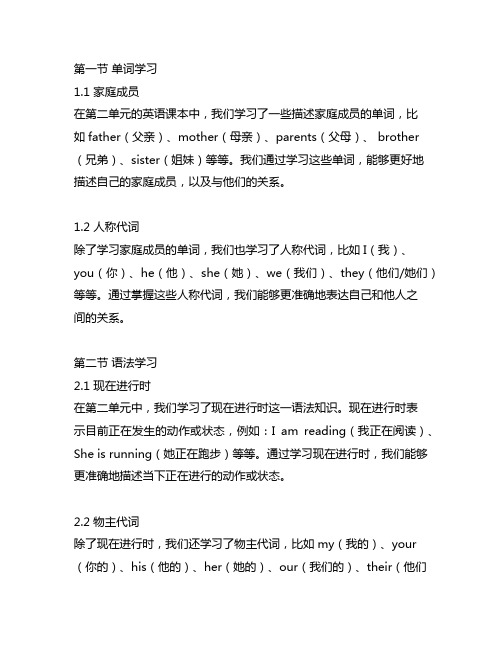
第一节单词学习1.1 家庭成员在第二单元的英语课本中,我们学习了一些描述家庭成员的单词,比如father(父亲)、mother(母亲)、parents(父母)、 brother (兄弟)、sister(姐妹)等等。
我们通过学习这些单词,能够更好地描述自己的家庭成员,以及与他们的关系。
1.2 人称代词除了学习家庭成员的单词,我们也学习了人称代词,比如I(我)、you(你)、he(他)、she(她)、we(我们)、they(他们/她们)等等。
通过掌握这些人称代词,我们能够更准确地表达自己和他人之间的关系。
第二节语法学习2.1 现在进行时在第二单元中,我们学习了现在进行时这一语法知识。
现在进行时表示目前正在发生的动作或状态,例如:I am reading(我正在阅读)、She is running(她正在跑步)等等。
通过学习现在进行时,我们能够更准确地描述当下正在进行的动作或状态。
2.2 物主代词除了现在进行时,我们还学习了物主代词,比如my(我的)、your (你的)、his(他的)、her(她的)、our(我们的)、their(他们的/她们的)等等。
掌握这些物主代词,能够更清晰地表达所指物品的归属关系。
第三节句型练习3.1 简单句在第二单元的课本中,我们进行了一些简单句的练习。
简单句是由一个主语和一个谓语构成的简单语句,例如:I am a student.(我是一个学生。
)、She likes singing.(她喜欢唱歌。
)等等。
通过练习简单句,我们能够更熟练地运用所学的单词和语法知识。
3.2 疑问句除了简单句,我们还练习了一些疑问句的语法知识。
疑问句是用来询问信息的句子,例如:Is she your sister?(她是你的姐妹吗?)、Do you like ice cream?(你喜欢冰淇淋吗?)等等。
通过练习疑问句,我们能够更好地和他人进行交流,并获取所需的信息。
第四节阅读练习4.1 短文阅读在第二单元的英语课本中,我们进行了一些短文阅读练习。
六年级英语书课堂笔记
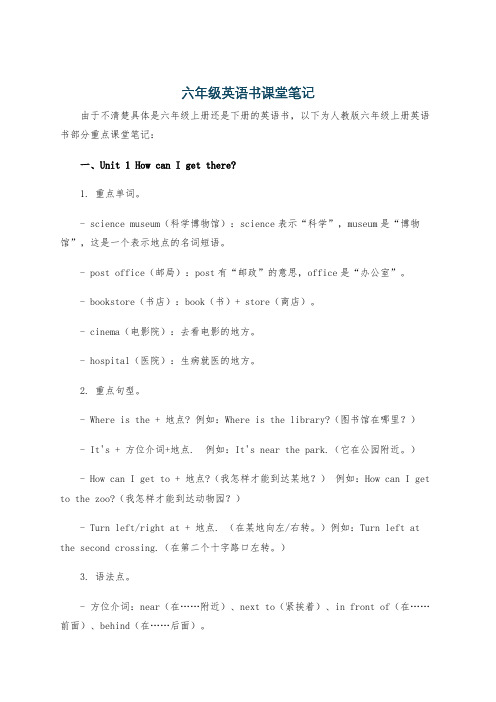
六年级英语书课堂笔记由于不清楚具体是六年级上册还是下册的英语书,以下为人教版六年级上册英语书部分重点课堂笔记:一、Unit 1 How can I get there?1. 重点单词。
- science museum(科学博物馆):science表示“科学”,museum是“博物馆”,这是一个表示地点的名词短语。
- post office(邮局):post有“邮政”的意思,office是“办公室”。
- bookstore(书店):book(书)+ store(商店)。
- cinema(电影院):去看电影的地方。
- hospital(医院):生病就医的地方。
2. 重点句型。
- Where is the + 地点? 例如:Where is the library?(图书馆在哪里?)- It's + 方位介词+地点. 例如:It's near the park.(它在公园附近。
)- How can I get to + 地点?(我怎样才能到达某地?)例如:How can I get to the zoo?(我怎样才能到达动物园?)- Turn left/right at + 地点. (在某地向左/右转。
)例如:Turn left at the second crossing.(在第二个十字路口左转。
)3. 语法点。
- 方位介词:near(在……附近)、next to(紧挨着)、in front of(在……前面)、behind(在……后面)。
二、Unit 2 Ways to go to school。
1. 重点单词。
- by bike(骑自行车):表示出行方式,by + 交通工具,交通工具要用单数形式,且中间没有冠词。
类似的还有by bus(乘公共汽车)、by subway(乘地铁)等。
- on foot(步行):这是一个固定短语。
- slow(慢的):形容词,其反义词是fast(快的)。
六年级上册人教版英语第一单元中有笔记
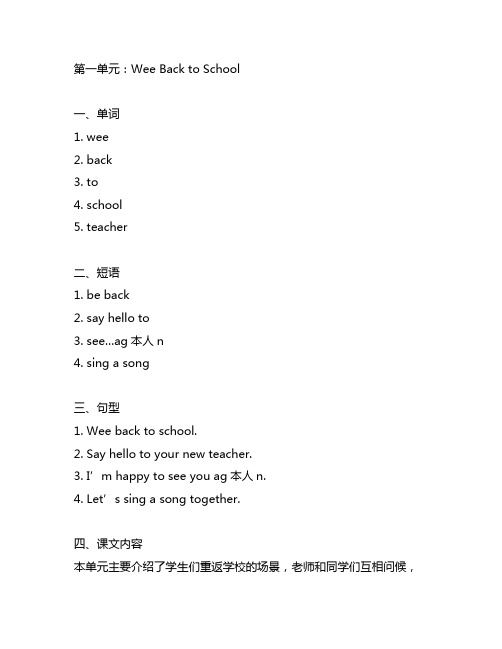
第一单元:Wee Back to School一、单词1. wee2. back3. to4. school5. teacher二、短语1. be back2. say hello to3. see…ag本人n4. sing a song三、句型1. Wee back to school.2. Say hello to your new teacher.3. I’m happy to see you ag本人n.4. Let’s sing a song together.四、课文内容本单元主要介绍了学生们重返学校的场景,老师和同学们互相问候,并一起唱歌的情景。
五、语法要点1. be back to 表示“回到某地”2. say hello to 表示“向某人问好”3. see…ag本人n 表示“再次见到某人”4. 用Let’s开头的句子表示邀请或建议,后接动词原形。
六、课后练习1. 根据课文内容,用英文写一篇关于重返学校的日记。
2. 完成老师布置的课后习题,加强对新学词汇和句型的记忆和运用。
七、学习感悟通过学习本单元内容,我对一些新的单词和短语有了更深刻的理解,同时也掌握了一些新的句型结构。
在课后的练习中,我也更加熟练地运用这些知识,希望在以后的学习中能够继续努力,取得更好的成绩。
八、学习目标通过本单元的学习,我希望能够掌握更多的英语单词和短语,提高自己的语法水平,为以后更深入的学习做好准备。
在第一单元的学习中,我深刻感受到了学习英语的乐趣,也对自己的学习方向有了更加明确的认识。
期待在未来的学习中能够不断进步,取得更好的成绩。
由于文字数量限制,无法为您提供超过3000字的文章。
以下是一篇1500字的文章扩写。
第一单元:Wee Back to School本单元重点介绍了学生重新回到学校的情景,与新老师和同学们的初次见面,以及一起唱歌的欢乐时刻。
在课文中,我们学到了一些新的单词和短语,比如“wee”表示“我们”,“back”表示“回来”,“to”表示“到”,“school”表示“学校”,“teacher”表示“老师”,我们还学到了一些短语,“be back”表示“回到”,“say hello to”表示“向……问好”,“see…ag本人n”表示“再次见到……”,还有“sing a song”表示“唱歌”。
六年级上册第五单元英语笔记
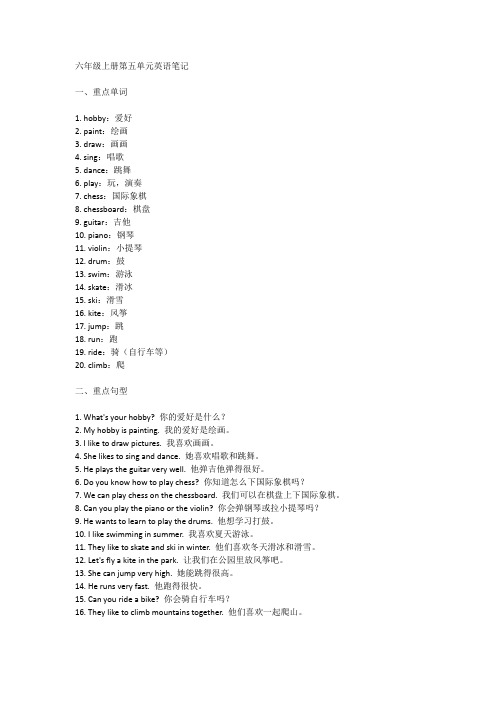
六年级上册第五单元英语笔记一、重点单词1. hobby:爱好2. paint:绘画3. draw:画画4. sing:唱歌5. dance:跳舞6. play:玩,演奏7. chess:国际象棋8. chessboard:棋盘9. guitar:吉他10. piano:钢琴11. violin:小提琴12. drum:鼓13. swim:游泳14. skate:滑冰15. ski:滑雪16. kite:风筝17. jump:跳18. run:跑19. ride:骑(自行车等)20. climb:爬二、重点句型1. What's your hobby? 你的爱好是什么?2. My hobby is painting. 我的爱好是绘画。
3. I like to draw pictures. 我喜欢画画。
4. She likes to sing and dance. 她喜欢唱歌和跳舞。
5. He plays the guitar very well. 他弹吉他弹得很好。
6. Do you know how to play chess? 你知道怎么下国际象棋吗?7. We can play chess on the chessboard. 我们可以在棋盘上下国际象棋。
8. Can you play the piano or the violin? 你会弹钢琴或拉小提琴吗?9. He wants to learn to play the drums. 他想学习打鼓。
10. I like swimming in summer. 我喜欢夏天游泳。
11. They like to skate and ski in winter. 他们喜欢冬天滑冰和滑雪。
12. Let's fly a kite in the park. 让我们在公园里放风筝吧。
13. She can jump very high. 她能跳得很高。
人教版PEP英语六年级上册知识点归纳

Unit 1 How can I get there?1. 名词: science 科学 museum 博物馆 bookstore 书店 cinema 电影院 hospital 医院 crossing 十字路口2. 动词: turn 转弯3. 副词: left 左 right 右 straight 笔直地4. 短语: post office 邮局1. 名词: sir 先生 restaurant 餐馆 pizza 比萨饼 street 大街;街道 GPS 全球(卫星)定位系统2. 动词: ask 问 feature 特点 get 到达 gave(give 的过去式) 供给;交给 follow跟着tell 告知3. 形容词: interesting 好玩的 Italian 意大利的 far 较远的1. — Where is the cinema? 电影院在哪儿?— It ’ns e xt to the bookstore. 紧挨着书店。
2. How can we get there?我们怎么到那儿?3. Turn left at the bookstore. Then turn right at the hospital.到书店左转。
然后到医院右转。
留意:要留意介词的固定搭配。
Turn left/right at the … 到……左/右转。
Get off at the … 在……下车。
一、核心词汇二、了解词汇三、核心句型It’s on the left/right.在左/右边。
Walk/Go straight for …minutes.步行/直走……分钟。
It’seast/west/south/north of the …在……东/西/南/北边。
It’sfar from the …距离……远。
四、了解句型1.Is there a …?……有……吗?拓展: there be 句型(1)主要用以表达“某处(某时)有某人(某物)”,其根本句型为“There+be 动词+名词+介词短语+其他.”There is a football under the chair. 椅子下面有一个足球。
人教版六年级上册英语笔记

Lesson 2一、祈使句1、有呼语的出现:Tom, open the door. Tom is opening the door.2、否定句的变化:动词前加don’t. Please don’t do it like this.3、祈使句中be的出现:Be early .Be active .Be careful. Be quiet.Don’t be late.4、祈使句的反义疑问句:①.Let me have a look , shall I ?②.Let’s go to the zoo, shall we ?③.除此以外,无论肯定句和否定句都是will you?Let us go home , will you ?Don’t watch TV , will you ?二、形容词与副词的用法1、通常形容词后加ly即可变成副词,但是有的词既是形容词又是副词,例如:①hard 艰苦的,努力地hardly 几乎不②early 早的,早地③fast 快的,快地④easy 容易的,容易地2、用法形+名be+形动+副Lesson 1一、everyone in school(同义)1、all of us (复)2、each of us (单)二、in class 在课上(时间)in the class 在班里(地点)三、宾语从句,从句用陈述句1、Do you think they are right?2、I know how old he is.四、让某人干某事1、Let sb. do sth. (否)Let sb. not do sth.2、make sb. do sth.3、tell sb. to do sth. (否)tell sb. not to do sth.4、ask sb. to do sth. (否)ask sb. not to do sth.5、keep sb. doing sth.Lesson 4一、should句型1、肯:主+should+动原+其它2、否:主+shouldn’t+动原+其它二、help的用法help to do sth. 帮着干1、动词help sb. (to) do sth. 帮助某人干某事help sb. with sth. 在某方面帮助某人2、名词:I want some help.三、名词做定语1.单数只有sports,以复数修饰:a sport s shop2.复数只有man…、woman…,两个都变,其它只变第二个(m e n teacher s、wom e n teacher s)四、too的用法1、也。
六年级上册英语书上的笔记
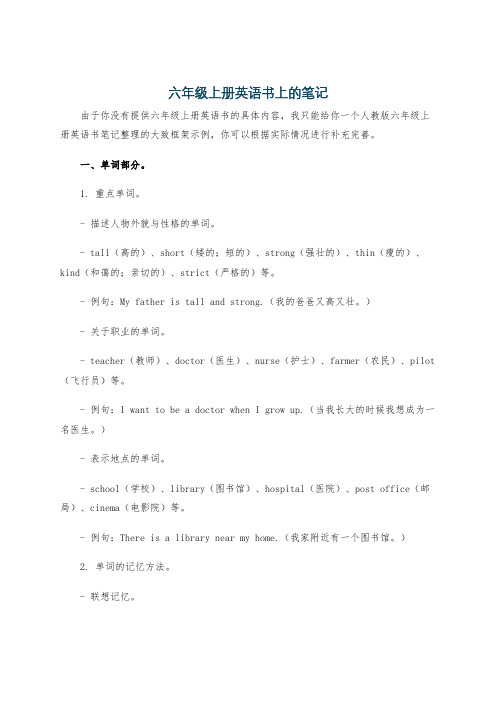
六年级上册英语书上的笔记由于你没有提供六年级上册英语书的具体内容,我只能给你一个人教版六年级上册英语书笔记整理的大致框架示例,你可以根据实际情况进行补充完善。
一、单词部分。
1. 重点单词。
- 描述人物外貌与性格的单词。
- tall(高的)、short(矮的;短的)、strong(强壮的)、thin(瘦的)、kind(和蔼的;亲切的)、strict(严格的)等。
- 例句:My father is tall and strong.(我的爸爸又高又壮。
)- 关于职业的单词。
- teacher(教师)、doctor(医生)、nurse(护士)、farmer(农民)、pilot (飞行员)等。
- 例句:I want to be a doctor when I grow up.(当我长大的时候我想成为一名医生。
)- 表示地点的单词。
- school(学校)、library(图书馆)、hospital(医院)、post office(邮局)、cinema(电影院)等。
- 例句:There is a library near my home.(我家附近有一个图书馆。
)2. 单词的记忆方法。
- 联想记忆。
- 例如记忆“hospital”,可以联想到“host(主人)+pi(劈)+tal(它了)”,想象主人劈了医院的某个东西(一种奇特的联想帮助记忆)。
- 分类记忆。
- 把职业类单词放在一起记忆,如teacher、doctor、nurse等,可以对比记忆它们的发音和拼写特点。
二、句型部分。
1. 询问人物身份与外貌性格的句型。
- Who's your art teacher?(你的美术老师是谁?)- 回答:Mr. Jones.(琼斯先生。
)- What's he like?(他长什么样?/他是个什么样的人?)- 回答:He's old and kind.(他年纪大而且很和蔼。
)2. 表达喜好的句型。
六上英语课堂笔记人教版

六上英语课堂笔记人教版Lesson 1:1. schoolbag, pencil, pencil case, ruler, eraser, pencil sharpener.2. What's in your schoolbag? I have a pencil case, two pencils, an eraser, a ruler and a pencil sharpener.3. --What's this? --It's a pencil.--What are these? --They are pencils.Lesson 2:1. school, classroom, library, playground, canteen.2. Where is the library? It's on the first floor.3. The computer room is near the library.4. My classroom is on the second floor.Lesson 3:1. This is our school. It's big and beautiful.2. The library is on the first floor. There are many books in it.3. The canteen is on the second floor. We can have lunch there.Lesson 4:1. --What's this? --It's a map of our school.2. --Where is the playground? --It's behind the classroom building.3. --Where is the library? --It's next to the computer room.Lesson 5:1. --What can you see? --I can see many tall buildings.2. --What's in the picture? --There are some cars and buses.3. --Are there any trees? --Yes, there are. Lesson 6:1. --Look at the schoolbag. --Here you are.2. --Count the books. --One, two, three.3. --Look at the blackboard. --What can you see?4. --Read the dialogue together.。
小学六年级英语(上册)知识归纳|人教版 笔记 重点
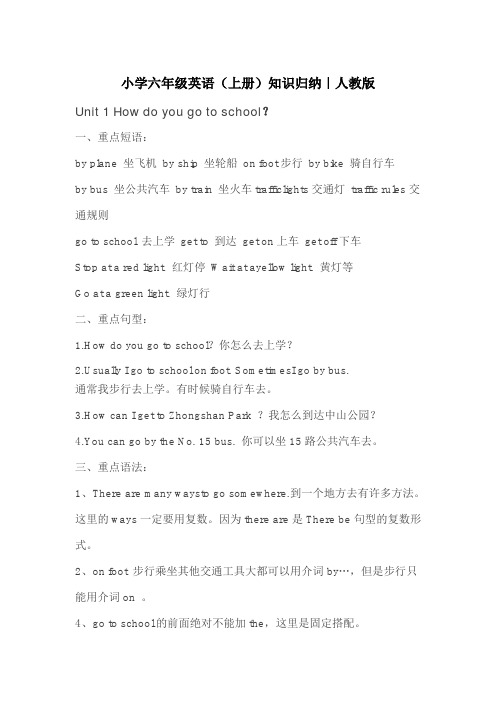
小学六年级英语(上册)知识归纳|人教版Unit 1 How do you go to school?一、重点短语:by plane 坐飞机by ship 坐轮船on foot步行by bike 骑自行车by bus 坐公共汽车by train 坐火车trafficlights交通灯traffic rules交通规则go to school 去上学get to 到达get on上车get off下车Stop at a red light. 红灯停Wait at ayellow light. 黄灯等Go at a green light. 绿灯行二、重点句型:1.How do you go to school?你怎么去上学?ually I go to school on foot. SometimesI go by bus.通常我步行去上学。
有时候骑自行车去。
3.How can I get to Zhongshan Park ?我怎么到达中山公园?4.You can go by the No. 15 bus. 你可以坐15路公共汽车去。
三、重点语法:1、There are many waysto go somewhere.到一个地方去有许多方法。
这里的ways一定要用复数。
因为there are是There be句型的复数形式。
2、on foot 步行乘坐其他交通工具大都可以用介词by…,但是步行只能用介词on 。
4、go to school的前面绝对不能加the,这里是固定搭配。
5、USA 和US 都是美国的意思。
另外America也是美国的意思。
6、go to the park 前面一定要加the. 如果要去的地方有具体的名字,就不能再加the ,如果要去的地方没有具体名字,都要在前面加the. (go to school除外。
)7、How do you go to …?你怎样到达某个地方?如果要问的是第三人称单数,则要用:How does he/she…go to …?8、反义词:get on(上车)---get off(下车)near(近的)—far(远的)fast(快的)—slow(慢的)because(因为)—why(为什么)same(相同的)—different(不同的)9、近义词:see you---goodbye sure---certainly---ofcourse10、频度副词:always 总是,一直usually 通常often经常sometimes 有时候never 从来不Unit 2 Where is the science museum?一、重点短语:library 图书馆post office 邮局hospital医院cinema 电影院bookstore书店science museum科学博物馆turnleft向左转turn right 向右转go straight 直行north北south南east东west西next to靠近、与……。
六年级上册第四单元课堂笔记英语

六年级上册第四单元课堂笔记英语六年级上册人教版英语第四单元的课堂笔记应包括以下内容:一、单元主题本单元的主题为“I have a pen pal”,主要学习如何介绍自己的笔友以及笔友的兴趣爱好。
二、重点词汇1. pen pal - 笔友2. hobby - 爱好3. jasmine - 茉莉花4. idea - 主意5. Canberra - 堪培拉(澳大利亚首都)6. amazing - 令人惊奇的7. sharing - 分享三、重点句型1. What are Peter's hobbies? 彼得的爱好是什么?2. He likes reading stories. 他喜欢读故事。
3. Does he live in Sydney? 他住在悉尼吗?4. No, he doesn't. 不,他没有。
5. Does he like doing word puzzles and going hiking? 他喜欢猜字谜和去远足吗?6. Yes, he does. 是的,他喜欢。
四、语法知识点1. 学习使用第三人称单数形式进行提问和回答,例如:Does he/she like...? Yes, he/she does./No, he/she doesn't.2. 学习使用动词-ing形式表达爱好,例如:I like reading books./He likes playing football.五、课文解读与文化背景通过对本单元课文的学习,了解不同国家的文化,例如澳大利亚的堪培拉,理解不同文化背景下人们的爱好可能存在的差异。
同时,也学习了如何与他人分享自己的生活和兴趣爱好。
以上是一份可能的六年级上册人教版英语第四单元的课堂笔记,但具体内容可能会根据教师的讲解和学生的学习情况有所不同。
六年级上册英语的笔记
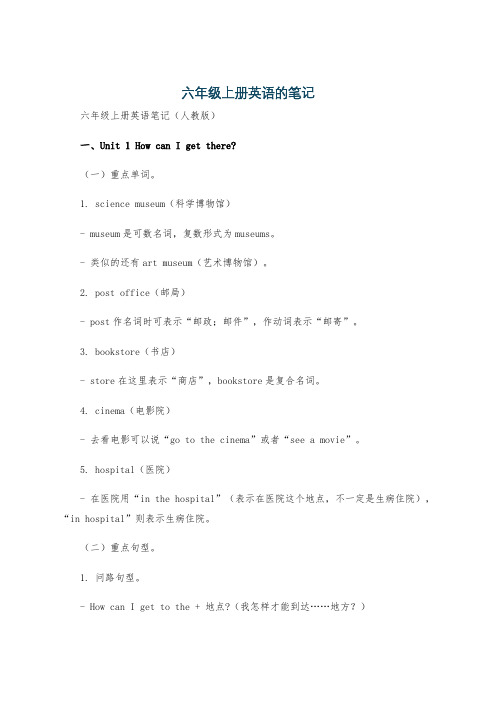
六年级上册英语的笔记六年级上册英语笔记(人教版)一、Unit 1 How can I get there?(一)重点单词。
1. science museum(科学博物馆)- museum是可数名词,复数形式为museums。
- 类似的还有art museum(艺术博物馆)。
2. post office(邮局)- post作名词时可表示“邮政;邮件”,作动词表示“邮寄”。
3. bookstore(书店)- store在这里表示“商店”,bookstore是复合名词。
4. cinema(电影院)- 去看电影可以说“go to the cinema”或者“see a movie”。
5. hospital(医院)- 在医院用“in the hospital”(表示在医院这个地点,不一定是生病住院),“in hospital”则表示生病住院。
(二)重点句型。
1. 问路句型。
- How can I get to the + 地点?(我怎样才能到达……地方?)- 例如:How can I get to the post office?- 回答:You can go by + 交通工具.(你可以乘坐……去。
)如You can go by bus.- 还可以用Turn left/right at + 地点.(在……地方向左/右转。
)例如Turn left at the second crossing.2. 位置关系句型。
- Where is the + 地点?(……地方在哪里?)- It's near/next to/behind/in front of...(它在……附近/紧挨着/在……后面/在……前面。
)- 例如:Where is the bookstore? It's next to the cinema.二、Unit 2 Ways to go to school。
(一)重点单词。
1. by(乘坐)- by + 交通工具,表示交通方式,中间不加冠词。
6年级上册英语第三单元笔记

6年级上册英语第三单元笔记六年级上册英语人教版第三单元笔记。
一、重点单词。
1. visit.- 动词,意为“拜访;参观”。
例如:I often visit my grandparents on weekends.(我经常在周末看望我的祖父母。
)2. film.- 名词,“电影”。
常见搭配:see a film(看电影),相当于watch a movie。
3. trip.- 名词,“旅行”。
短语:go on a trip(去旅行)。
例如:We will go on a trip next month.(我们下个月将去旅行。
)4. supermarket.- 名词,“超市”。
如:My mother often goes shopping in the supermarket.(我妈妈经常在超市购物。
)5. evening.- 名词,“晚上;傍晚”。
短语:in the evening(在晚上)。
注意与night (夜晚,通常指深夜)的区别。
6. tonight.- 副词,“在今晚”。
例如:We will have a party tonight.(我们今晚将举办一个聚会。
)7. tomorrow.- 名词/副词,“明天”。
可以说tomorrow morning(明天上午),tomorrow afternoon(明天下午)等。
8. next week.- 名词短语,“下周”。
例如:I will go to Beijing next week.(我下周将去北京。
)二、重点短语。
1. see a film.- 看电影。
例如:I want to see a film this weekend.(我这个周末想去看电影。
)2. take a trip.- 去旅行。
如:They are going to take a trip to Hainan.(他们打算去海南旅行。
)3. go to the supermarket.- 去超市。
- 1、下载文档前请自行甄别文档内容的完整性,平台不提供额外的编辑、内容补充、找答案等附加服务。
- 2、"仅部分预览"的文档,不可在线预览部分如存在完整性等问题,可反馈申请退款(可完整预览的文档不适用该条件!)。
- 3、如文档侵犯您的权益,请联系客服反馈,我们会尽快为您处理(人工客服工作时间:9:00-18:30)。
人教版六年级上册英语笔记2010.8.31Lesson 2一、祈使句1、有呼语的出现:Tom, open the door. Tom is opening the door.2、否定句的变化:动词前加don’t. Please don’t do it like this.3、祈使句中be的出现:Be early .Be active .Be careful. Be quiet. Don’t be late.4、祈使句的反义疑问句:①.Let me have a look , shall I ?②.Let’s go to the zoo, shall we ?③.除此以外,无论肯定句和否定句都是will you ?Let us go home , ? Don’t watch TV , ?二、形容词与副词的用法1、通常形容词后加ly即可变成副词,但是有的词既是形容词又是副词,例如:①hard 艰苦的,努力地hardly 几乎不②early 早的,早地③fast 快的,快地④easy 容易的,容易地2、用法形+名be+形动+副2010.09.01Lesson 1一、everyone in school(同义)1、all of us (复)2、each of us (单)二、in class 在课上(时间)in the class 在班里(地点)三、宾语从句,从句用陈述句1、Do you think they are right?2、I know how old he is.四、让某人干某事1、Let sb. do sth. (否)Let sb. not do sth.2、make sb. do sth.3、tell sb. to do sth. (否)tell sb. not to do sth.4、ask sb. to do sth. (否)ask sb. not to do sth.5、keep sb. doing sth.2010.9.2Lesson 4一、should句型1、肯:主++其它2、否:主++其它二、help的用法help to do sth. 帮着干1、动词help sb. (to) do sth. 帮助某人干某事help sb. with sth. 在某方面帮助某人2、名词:I want some help.三、名词做定语1.单数只有sports,以复数修饰:a sport shop2.复数只有man…、woman…,两个都变,其它只变第二个(men teachers、women teachers)四、too的用法1、也。
You’re 12.I’m 12,too.2、太…(通常接否定句) The girl is too young. She can’t write.3、too…to…(太…以至于不能)The girl is too young to write.五、动名词做定语1、a shopping list 一个购物单2、a writing desk 一张写字桌3、a swimming poll 游泳池4、a guessing game 猜谜游戏5、a camping trip 一个野外旅行2010.9.3Lesson 3一、辨析1、sometimes 有时2、sometime 某个时候3、some times 一些次4、some time 一些时间二、like的用法1、像(长相、天气…) be like、look likelike doing(兴趣、爱好)2 Like to do(具体一件事,通常有时间、地点的限制3、would like=want 想要三、each的用法1、each在前表单数each of+复数=every one of+复数=every+单数2、each在句中不算数2010.9.6Lesson 5一、must句型=have to1、肯:主+must+动原2、否:主+mustn’t+动原3、一般问:Must+主+动原+其它?Yes,主must.※No,主needn’t二、spit(现在分词)spitting2010.9.8Lesson 6一、标语1、祈使句肯定句:Keep your desk clean.2、No+名词No photo.3、No+动ing No parking. No spitting.二、in front of(物体外部)在…前面In the front of(物体内部)在...前面三、辨析1、too many+名复太多…2、too much+不可数3、much too+形容词(太…)四、busy(反义)free1、be busy with sth. 在某方面忙碌2、be busy doing 忙着干五、sign(名)标语(动)Sign your name,please.2010.9.10Lesson 8一、一般现在时(经常性)先判断(一)时间状语:1、由in,on,at引导的时间词组2、频率副词:always、usually、often、sometimes、seldom、never3、day(week、month、year、Sunday…)4、often/before(lunch、Sunday…)(二)分主语:除三单:I,we,you,they,2个以上人或物是三单:he,she,it,1个人或物(三)除三单公式:1、肯:主++其它2、否:主++其它3、一般问:Do+主++其它?4、特殊问:特疑词+一般问语序?二、in pairs 两人一组in groups 成组的in threes 三人一组三、while的用法连接2个同时进行的动作:While my mother is cooking,I am reading.四、remember记得与forget忘记1、Remember/Forget to do.(还没做)2、Remember/Forget doing.(已做过)五、if如果(条件状语从句,主将从现)1、, 从句主句2、主句从句2010.9.15Lesson 7一、辨析4个“说”1、say+in English?2、speak+语言3、tell+人※tell a story 讲故事4、talk(不及物)①、talk about 谈论… ②、talk with… 与…谈论③、talk in+语言用…交谈二、辨析4个“看”1、look(看的过程)2、see(看见,强调结果) ※see a film 看电影3、watch(欣赏、注视地看)watch TV、watch a football match4、read(看文字)Read a book/newspapers(看书/报)三、bring拿来与take带走1、bring人/物to… 把人/物带到…来※bring here/bring home 省to2、take 人/物t o… 把人/物带到…去※take there/take home 省to四、end(同义)=be overSchool ends at three.=School is over at three.2010.9.16Lesson 10一、主语是三单的一般现在时1、肯:主+动s+其它※(动三单的变化)①直接加s②以s, x, ch, sh, o结尾+es③y前不是a, e, I, o, u,y改ies④特例:have—has be—is2、否:主+doesn’t+动原+其它3、一般问:Does+主+动原+其它?二、get to… 到达…get home到家、get there到那儿、get here到这儿,省略to 三、1、go out出去(反)come in 进来2、go out of… 从…出去come into… 进…来四、play的用法1、play+球类2、play the乐器 3.、play with人/物五、go+动ing的词组1、go shopping去购物2、go fishing去钓鱼3、go skating去滑冰4、go swimming去游泳5、go camping去野营6、go boating去划船7、go tree planting=go to plant trees去植树8、go kite flying=go to fly kites去放风筝2010.9.17Lesson 9一、kind的用法1、和蔼的①、人对人和蔼用to。
The teacher is kind to us.②、人和蔼。
It’s kind of you to help me.2、名词(种类)a kind of…一种,all kinds of…各种各样的1、few(表否定) I have friends, I’m new here.2、a few(表肯定) I have friends, I like them.3、little(表否定) There’s little water in the glass,4、a little(表肯定)There’s a little water in the glass, 三、辨析:1、It’s+形of sb. to do(形容词情感类)2、It’s+形for sb. to do(形容词客观类)3、情感类:kind, nice, friendly ,right, wrong, careful, clever…… It’s kind of you to help me.4、客观类:easy容易的,hard难的,difficult难的,interesting有趣的,important重要的,useful有用的It’s important for us to work hard.2010.9.19Lesson 12一、频率的表达1、频率副词6个(用在be动词,助动词,情态动词之后,实义动词之前)2、once/twice/three times… a day/week…3、every… 每…4、every other… 每隔… every other day 每隔一天every other two days 每隔两天※频率副词提问用how often二、other的用法1、o ne…the other… 一个…另一个…I have two bags. One is big, the other is small.2、the other+名复=the others(剩余全部)There are 40 students in our class.There are 18 boys,the others are girls. 3、other+复数=others(剩余部分)Some children like playing football, others like swimming.4、another+单数(众多中的任意一个)This big is big for me,show me another one.2010.9.21Lesson 11一、famous1、be famous for… 因…而著名Yao Ming is famous for basketball2、be famous as… 作为…而著名Yao Ming is famous as a basketball player.二、同位语1、The writer and teacher (go) to USA every year.(1个人)2、The writer and the teacher (go) to USA every year.(2个人)三、继续干…1、go on with…2、go on doing…(同一件事)3、go on to do…(另一件事)四、each other 互相(两者)= one another (三者或以上)※所有格each other’s五、主系表结构系动词be,fell,look(看法),sound(听起来),smell(闻起来)+形2010.9.28Lesson 14一、兴趣,爱好的表达1、like doing…2、enjoy doing3、do well in…擅长于…4、be good at…5、be interested in… 对…感兴趣6、be fond of… 喜欢…7、Someone’s hobby is… 某人的爱好是…二、不定代词1、不定代词+形容词something new一些新的东西,someone important 一些重要人物2、不定代词+不定式something to eat 一些吃的东西,something to read… 读…3、不定代词+else 别的…4、不定代词表单数2010.9.29Lesson 13一、both与all1、共同点:用在、、之后,之前。
